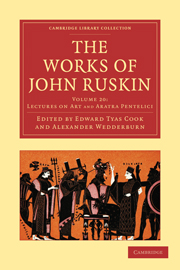Book contents
- Frontmatter
- Contents
- LIST OF ILLUSTRATIONS
- INTRODUCTION TO THIS VOLUME
- LIST OF RUSKIN'S OXFORD LECTURES DURING HIS FIRST TENURE OF THE SLADE PROFESSORSHIP (1870—1878)
- PART I “LECTURES ON ART” (INAUGURAL COURSE DELIVERED AT OXFORD IN HILARY TERM, 1870)
- PART II “ARATRA PENTELICI” (SIX LECTURES ON THE ELEMENTS OF SCULPTURE, DELIVERED AT OXFORD IN MICHAELMAS TERM, 1870)
- BIBLIOGRAPHICAL NOTE
- CONTENTS
- PREFACE
- TEXT
- APPENDIX: LECTURES AND NOTES FOR LECTURES ON GREEK ART AND MYTHOLOGY (1870)
- Plate section
PREFACE
Published online by Cambridge University Press: 07 September 2011
- Frontmatter
- Contents
- LIST OF ILLUSTRATIONS
- INTRODUCTION TO THIS VOLUME
- LIST OF RUSKIN'S OXFORD LECTURES DURING HIS FIRST TENURE OF THE SLADE PROFESSORSHIP (1870—1878)
- PART I “LECTURES ON ART” (INAUGURAL COURSE DELIVERED AT OXFORD IN HILARY TERM, 1870)
- PART II “ARATRA PENTELICI” (SIX LECTURES ON THE ELEMENTS OF SCULPTURE, DELIVERED AT OXFORD IN MICHAELMAS TERM, 1870)
- BIBLIOGRAPHICAL NOTE
- CONTENTS
- PREFACE
- TEXT
- APPENDIX: LECTURES AND NOTES FOR LECTURES ON GREEK ART AND MYTHOLOGY (1870)
- Plate section
Summary
1. I must pray the readers of the following Lectures to remember that the duty at present laid on me at Oxford is of an exceptionally complex character. Directly, it is to awaken the interest of my pupils in a study which they have hitherto found unattractive, and imagined to be useless; but more imperatively, it is to define the principles by which the study itself should be guided; and to vindicate their security against the doubts with which frequent discussion has lately encumbered a subject which all think themselves competent to discuss. The possibility of such vindication is, of course, implied in the original consent of the Universities to the establishment of Art Professorships. Nothing can be made an element of education of which it is impossible to determine whether it is ill done or well; and the clear assertion that there is a canon law in formative Art is, at this time, a more important function of each University than the instruction of its younger members in any branch of practical skill. It matters comparatively little whether few or many of our students learn to draw; but it matters much that all who learn should be taught with accuracy. And the number who may be justifiably advised to give any part of the time they spend at college to the study of painting or sculpture ought to depend, and finally must depend, on their being certified that painting and sculpture, no less than language, or than reasoning, have grammar and method,—that they permit a recognizable distinction between scholarship and ignorance, and enforce a constant distinction between Right and Wrong.
- Type
- Chapter
- Information
- The Works of John Ruskin , pp. 193 - 198Publisher: Cambridge University PressPrint publication year: 2010First published in: 1905

